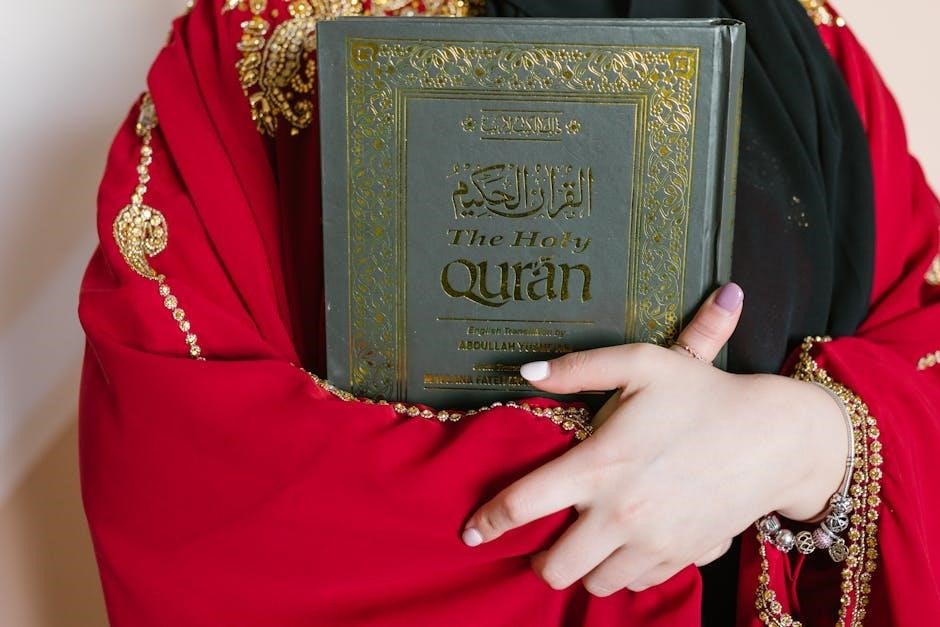pdf 99 names of allah
The 99 Names of Allah, known as Asma ul Husna, are divine attributes reflecting His mercy, power, and wisdom. They originate from the Quran and Hadith, serving as a foundation for worship and spiritual connection.
1.1 Significance of the Names in Islam
The 99 Names of Allah, or Asma ul Husna, hold profound significance in Islam, representing Allah’s divine attributes and perfection. These names, derived from the Quran and Hadith, embody His mercy, justice, and power. Muslims are encouraged to learn and reflect on these names to deepen their faith and connection with Allah. Reciting them is a form of worship, fostering spiritual growth and humility. The names also serve as a reminder of Allah’s majesty and His role as the Creator and Sustainer of all creation. Their study and memorization are highly rewarded in Islam, as emphasized by Prophet Muhammad (peace be upon him), who stated that knowing these names leads to Paradise. PDF resources offer a structured way to explore and understand these sacred names, making them accessible for learning and reflection in daily life. By engaging with the 99 Names, believers can strengthen their relationship with Allah, seeking guidance and blessings through His beautiful attributes.
1.2 Overview of the PDF Resource
The PDF resource on the 99 Names of Allah provides a comprehensive guide to understanding and reflecting on these divine attributes. It includes Arabic text, transliterations, and detailed meanings of each name, along with their significance in Islam. The document is structured for easy learning, offering insights into the spiritual and theological importance of the names. It serves as a valuable tool for Muslims seeking to deepen their faith, enhance their worship, and connect with Allah through His beautiful names. The PDF is widely available for free download, making it accessible for personal study, teaching, and sharing.

The Meaning and Importance of Asma ul Husna
The Asma ul Husna, or the 99 Names of Allah, are central to Islamic belief, embodying Allah’s divine attributes of mercy, power, and wisdom. They guide worship, foster spiritual growth, and deepen one’s connection with the Creator.
2.1 Definition and Origin of the 99 Names
The 99 Names of Allah, or Asma ul Husna, are divine attributes that define Allah’s essence, highlighting His mercy, power, and wisdom. Originating from the Quran and Hadith, these names are central to Islamic theology, revealing Allah’s characteristics. Prophet Muhammad (peace be upon him) emphasized their significance, stating that knowing and enumerating these names leads to Paradise. Rooted in Islamic scripture, the names are not arbitrary but are derived from Allah’s self-description and prophetic teachings, serving as a cornerstone for understanding His nature and fostering a deeper spiritual connection.
2.2 Spiritual and Theological Significance
The 99 Names of Allah hold profound spiritual and theological importance, serving as a gateway to understanding Allah’s divine attributes. They are central to Islamic worship, enabling believers to connect deeply with Allah through prayer and reflection. These names, as mentioned in the Quran and Hadith, embody Allah’s mercy, power, and wisdom, guiding Muslims in cultivating ethical conduct and spiritual growth. By invoking these names, believers seek blessings, guidance, and a closer relationship with their Creator, fostering humility, gratitude, and devotion in their faith journey.

Key Features of the PDF Document
The PDF document presents the 99 Names of Allah with transliteration, meanings, and spiritual significance, offering a structured layout for easy learning, reflection, and worship.
3.1 Layout and Structure of the PDF
The PDF is meticulously organized, featuring a clean and user-friendly layout. Each Name of Allah is presented with its Arabic text, transliteration, and English meaning. The document includes a table of contents for easy navigation, along with numbered listings for quick reference. Additional sections provide explanations of the significance of each Name, enhancing understanding. The structured format allows learners to progress seamlessly, making it ideal for both personal study and group discussions. This design ensures accessibility and clarity, fostering a deeper connection with the divine attributes.
3.2 Benefits of Using the PDF for Learning
The PDF offers a comprehensive and accessible way to learn the 99 Names of Allah. Its clear structure and transliteration aid in memorization, while detailed meanings enhance understanding. Ideal for personal study or group sessions, the document serves as a valuable resource for spiritual growth. It simplifies complex concepts, making it suitable for learners of all levels. The PDF also facilitates reflection and worship, helping users deepen their connection with Allah’s divine attributes. Its portability ensures ease of access anytime, anywhere, fostering consistent learning and devotion.

How to Download the 99 Names of Allah PDF
Visit trusted Islamic websites or platforms like OneDrive for the PDF. Search for “99 Names of Allah PDF” and select a reliable source. Click the download button to access the file, ensuring it includes all names with meanings and transliterations. Verify the document’s completeness and authenticity before saving it for personal or educational use.
4.1 Steps to Access the PDF File
To access the PDF, visit a trusted Islamic website or platform like OneDrive. Search for “99 Names of Allah PDF” and select a reliable file. Click the download button to save it. Ensure the document includes all 99 names with meanings and transliterations. Verify the file’s authenticity and completeness before downloading. Some platforms may require free registration or offer direct links. Always choose sources with positive reviews to ensure quality and accuracy.
4.2 Popular Platforms for Download
Popular platforms for downloading the 99 Names of Allah PDF include Islamic websites, OneDrive, and Google Drive. Many trusted sites offer free access, with options to download in PDF, Word, or text formats. Additionally, apps like “99 Names of Allah-AsmaUlHusna” provide downloadable content. Some platforms may require free registration. Always verify the authenticity of the source and check for reviews to ensure a reliable and complete document. This ensures a seamless and secure downloading experience for spiritual learning and reflection.

The Role of the 99 Names in Worship
The 99 Names of Allah are integral in worship, used in supplications and prayers to draw closer to Allah, reflecting His divine attributes and mercy always.
5.1 Incorporating the Names into Prayer
Muslims incorporate the 99 Names of Allah into their prayers, invoking them during supplications and glorifications. Reciting these names enhances spiritual connection and reflection, aligning with divine attributes. The practice is encouraged to deepen devotion and seek divine mercy, fostering a meaningful dialogue with the Almighty. This integration enriches worship, making prayers more heartfelt and meaningful, while adhering to Islamic teachings and traditions.
5.2 Benefits of Reciting the Names
Reciting the 99 Names of Allah brings numerous spiritual and emotional benefits. It strengthens one’s faith, fosters a deeper connection with Allah, and invokes divine mercy. The Names, when recited with sincerity, offer protection, guidance, and fulfillment of legitimate desires. Regular recitation is also believed to enhance personal character, promoting traits like mercy, justice, and wisdom. This practice, rooted in Islamic tradition, is a powerful means of seeking comfort, peace, and spiritual growth in daily life.
Understanding the Transliteration and Meaning
The 99 Names of Allah are beautifully explained in the PDF, offering clear transliterations and profound meanings. Each name reveals Allah’s attributes, fostering deeper spiritual understanding and connection.
6.1 Detailed Explanation of Each Name
The PDF provides a comprehensive breakdown of each of the 99 Names, offering transliterations, meanings, and profound explanations. Each name highlights Allah’s unique attributes, such as mercy (Ar-Rahmaan) and sovereignty (Al-Malik). The document delves into the linguistic roots and theological significance, enabling believers to grasp the depth of Allah’s characteristics. This detailed approach fosters a deeper understanding, helping individuals connect spiritually and apply these divine attributes in their worship and daily lives.
6.2 Linguistic and Cultural Context
The PDF explores the linguistic origins of the 99 Names, rooted in classical Arabic, emphasizing their poetic and theological richness. It highlights how these names are woven into Islamic culture, influencing art, literature, and calligraphy. The document also examines regional variations in pronunciation and cultural interpretations, showcasing the universal appeal of the Names while respecting their Arabic heritage. This context enriches the reader’s appreciation of the Names’ significance in diverse Islamic traditions worldwide.
The Connection Between the Quran and the 99 Names
The Quran explicitly references the 99 Names of Allah, emphasizing their divine origin and significance. These Names are central to understanding Allah’s attributes and worship in Islam.
7.1 References to the Names in the Quran
The Quran frequently mentions the 99 Names of Allah, highlighting their divine significance. For example, Surah Al-A’raf (7:180) states, “And to Allah belong the best names, so invoke Him by them.” Similarly, Surah Taha (20:8) declares, “To Him belong the best names,” underscoring their importance in worship and reflection. These references serve as a foundation for understanding Allah’s attributes, encouraging believers to invoke Him through these sacred names for guidance and spiritual growth.
7.2 Hadiths Highlighting the Importance of the Names
Prophet Muhammad (pbuh) emphasized the significance of the 99 Names, stating, “Allah has 99 names, and whoever enumerates them will enter Paradise” (Muslim). This Hadith underscores their importance in worship and spiritual growth. Reciting these names, as taught by the Prophet, is a means of seeking Allah’s mercy, forgiveness, and blessings. The Hadiths also illustrate the benefits of specific names, such as Ar-Rafi’ for elevation and As-Salam for peace, encouraging believers to incorporate them into their daily supplications and prayers.

Practical Applications of the 99 Names
The 99 Names are used in daily supplications, prayers, and for seeking blessings. They guide believers in understanding Allah’s attributes, fostering a deeper spiritual connection and practical worship.
8.1 Using the Names in Daily Life
The 99 Names of Allah are integral to daily life, offering guidance and spiritual strength. Muslims incorporate them into prayers, supplications, and personal reflections. Reciting specific Names, like Ar-Rahman for mercy or Al-Fattah for guidance, helps seekers navigate life’s challenges. These Names also inspire ethical behavior, fostering compassion, justice, and humility. Their recitation is believed to bring blessings, protection, and peace, making them a vital tool for personal and communal worship, as detailed in the PDF resource.
8.2 The Role of the Names in Spiritual Growth
The 99 Names of Allah are a powerful tool for spiritual growth, deepening one’s connection with the Divine. Reciting and reflecting on these Names helps believers understand Allah’s attributes, fostering humility, gratitude, and surrender. They guide individuals in cultivating virtues like compassion and justice, aligning their character with divine will; The Names also serve as a means to seek blessings, forgiveness, and guidance, enriching spiritual practices and bringing believers closer to Allah in heart and mind, as beautifully explained in the PDF resource.

The 99 Names of Allah in Islamic Culture
The 99 Names are deeply ingrained in Islamic culture, inspiring art, calligraphy, and literature. They are often beautifully displayed in mosques and homes, symbolizing divine attributes and fostering devotion.
9.1 Artistic and Literary Representations
The 99 Names of Allah are beautifully represented in Islamic art and literature, often inscribed in intricate calligraphy on manuscripts, mosque walls, and decorative items. These names are also central to Islamic poetry and hymns, such as naats, which praise Allah’s attributes. Digital platforms offer downloadable posters, stickers, and apps featuring these names, blending tradition with modern design to inspire reflection and memorization. Such artistic expressions highlight the cultural significance of the names, fostering a deeper spiritual connection among believers.
9.2 The Names in Islamic Calligraphy and Design
The 99 Names of Allah are often showcased in exquisite Islamic calligraphy, a revered art form emphasizing the divine beauty of the Arabic script. These names are meticulously designed in intricate patterns, adorning mosque walls, manuscripts, and decorative items. Digital tools now allow for modern calligraphy designs, blending tradition with contemporary aesthetics. The names are also featured in Islamic art and design, symbolizing spiritual reverence and cultural identity, making them a timeless inspiration for artists and believers alike.
The 99 Names of Allah are divine attributes that inspire worship, spiritual growth, and reflection, highlighting His mercy and power as outlined in the Quran and Hadith.
10.1 Final Thoughts on the Significance of the 99 Names
The 99 Names of Allah are profound divine attributes that encapsulate His mercy, power, and wisdom. They serve as a timeless guide for worship, reflection, and spiritual growth, deeply rooted in Islamic faith. Each name offers insight into Allah’s character, fostering a deeper connection with Him. By understanding and invoking these names, believers can strengthen their faith and find guidance in daily life, ultimately seeking closeness to Allah.
These names, as highlighted in the Quran and Hadith, are a treasure of spiritual wisdom, inspiring believers to embody the values they represent. They remind us of Allah’s majesty and grace, inviting us to reflect on His creation and our purpose. The 99 Names of Allah are not just names but a pathway to spiritual enlightenment and a deeper understanding of His divine will.
10.2 Encouragement to Explore and Reflect
Embrace the profound wisdom of the 99 Names of Allah by exploring their meanings and reflecting on their significance. This divine resource offers a deeper understanding of Allah’s attributes, fostering spiritual growth and connection. Take time to study the PDF, recite the names, and contemplate their relevance to your life. Let these sacred names guide you in worship, decision-making, and daily reflections, drawing you closer to Allah and enriching your faith journey.
Use the PDF as a tool for personal development and spiritual enrichment. Share its teachings with others, inspiring collective growth and a stronger bond with Allah. May this exploration ignite a renewed commitment to living according to His will and attributes.
Leave a Reply